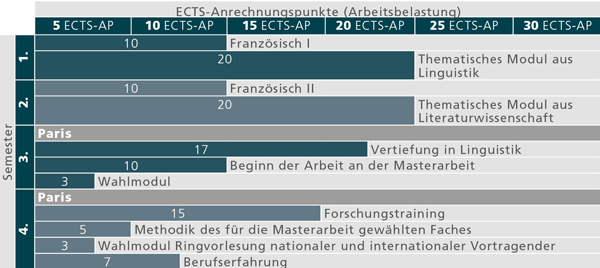Masterstudium Sprachliche und literarische Varietäten in der frankophonen Welt
Curriculum (2010W)
Gemeinsames Masterstudium der Universität Innsbruck und der Université Paris Descartes
Master of Arts (MA)
Dauer / ECTS-AP
4 Semester / 120 ECTS-AP
Studienart
Vollzeit
Sprache
Deutsch / Französisch
Voraussetzung
Fachlich infrage kommendes Bachelorstudium oder Äquivalent und Sprachnachweis
Fakultät
Philologisch-Kulturwissenschaftliche Fakultät
Niveau der Qualifikation
Master (2. Studienzyklus)
ISCED-11: Stufe 7, EQR/NQR: Stufe 7
ISCED-F
0232 Literatur und Linguistik
Studienkennzahl
UC 066 954
Informationen zum Curriculum (2010W)
Ab dem Wintersemester 2024/2025 darf keine Zulassung mehr zu diesem Studium erfolgen.
Die Gesamtfassung des Curriculums spiegelt das aktuell gültige Curriculum wider, ist rechtlich unverbindlich und dient lediglich der Information. Die rechtlich verbindliche Form des Curriculums inkl. etwaiger Änderungen finden Sie in den entsprechenden Mitteilungsblättern.
Die Information, welche Curriculumsversion für Sie gilt, entnehmen Sie bitte Ihrem Studienblatt
abrufbar unter: https://lfuonline.uibk.ac.at/public/lfuonline_meinestudien.studienblatt
Spalte: Curriculum in der geltenden Fassung
- Mitteilungsblatt vom 18.10.2023, 2. Stück, Nr. 37 (Auflassung ordentlicher Studien)
- Curriculum/Gesamtfassung (ab 01.10.2016)
- Mitteilungsblatt vom 31.03.2016, 17. Stück, Nr. 300 (Änderung des Curriculums)
- Mitteilungsblatt vom 30.06.2010, 46. Stück, Nr. 342
Voraussetzung
Fachlich infrage kommendes Bachelorstudium an der Universität Innsbruck:
- Bachelorstudium Französisch (2009W)
- Bachelorstudium Französisch (2015W)
Nachweis der Allgemeinen Universitätsreife:
Die allgemeine Universitätsreife für die Zulassung zu einem Masterstudium ist durch den Abschluss eines fachlich in Frage kommenden Bachelorstudiums, eines anderen fachlich in Frage kommenden Studiums mindestens desselben hochschulischen Bildungsniveaus an einer anerkannten inländischen oder ausländischen postsekundären Bildungseinrichtung oder eines im Curriculum des Masterstudiums definierten Studiums nachzuweisen. Zum Ausgleich wesentlicher fachlicher Unterschiede können Ergänzungsprüfungen (maximal 30 ECTS-AP) vorgeschrieben werden, die bis zum Ende des zweiten Semesters des Masterstudiums abzulegen sind. Das Rektorat kann festlegen, welche dieser Ergänzungsprüfungen Voraussetzung für die Ablegung von im Curriculum des Masterstudiums vorgesehenen Prüfungen sind.
Im Zuge des Nachweises der Allgemeinen Universitätsreife wird jedenfalls die Absolvierung folgender Kernbereiche im Rahmen des abgeschlossenen Bachelorstudiums geprüft:
- 45 ECTS-AP aus dem Kernbereich Sprachbeherrschung
- 30 ECTS-AP aus dem Kernbereich Linguistik
- 30 ECTS-AP aus dem Kernbereich Literaturwissenschaft
- 20 ECTS-AP aus dem Kernbereich Kulturwissenschaft
Empfohlener Studienverlauf
Der unten angeführte, exemplarische Studienverlauf gilt als Empfehlung für Vollzeitstudierende, die das Studium im Wintersemester beginnen. Die Aufstellung dient der Darstellung eines möglichen Studienablaufs und ist nicht verpflichtend. Etwaige Prüfungswiederholungen bzw. deren studienzeitverzögernde Wirkung sind nicht berücksichtigt.
Die Regelstudienzeit beträgt 4 Semester bzw. 120 ECTS-AP, wobei gemäß Universitätsgesetz die Arbeitsbelastung eines Studienjahres 1.500 (Echt-)Stunden zu betragen hat und dieser Arbeitsbelastung 60 Anrechnungspunkte zugeteilt werden (ein ECTS-Anrechnungspunkt entspricht einer Arbeitsbelastung der Studierenden von 25 Stunden).
10,0 ECTS-AP: Französisch I
20,0 ECTS-AP: Thematisches Modul aus Linguistik
10,0 ECTS-AP: Französisch II
20,0 ECTS-AP: Thematisches Modul aus Literaturwissenschaft
17,0 ECTS-AP: Vertiefung in Linguistik
10,0 ECTS-AP: Beginn der Arbeit an der Masterarbeit
3,0 ECTS-AP: Wahlmodul
15,0 ECTS-AP: Forschungstraining
5,0 ECTS-AP: Methodik des für die Masterarbeit gewählten Faches
3,0 ECTS-AP: Wahlmodul Ringvorlesung nationaler und internationaler Vortragende
7,0 ECTS-AP: Berufserfahrung

| Semester | ECTS-AP | Titel |
|---|---|---|
Informationen zur Prüfungsordnung inkl. Bewertung und Benotung
Prüfungsordnung
Die Prüfungsordnung ist integraler Bestandteil des Curriculums, detaillierte Informationen finden Sie unter dem Paragrafen Prüfungsordnung.
Bei der Notenverteilungsskala handelt es sich um die statistische Darstellung der Verteilung aller positiv absolvierten Prüfungen, die innerhalb eines Studiums bzw. eines Studienfaches (unter Heranziehung aller gemeldeten Studierenden eines Studiums bzw. eines Studienfaches) erfasst wurden. Die Notenverteilungsskala wird in regelmäßigen Abständen aktualisiert.
| Österreichische Notenskala | Definition | %-Satz | ||
| 1 | SEHR GUT | 50,0 | = 100% | |
| 2 | GUT | 25,0 | ||
| 3 | BEFRIEDIGEND | 20,0 | ||
| 4 | GENÜGEND | 5,0 | ||
| 5 | NICHT GENÜGEND |
März 2025
Gesamtbeurteilung der Qualifikation
Nicht zutreffend
Erklärung: Eine Gesamtbeurteilung (mit Auszeichnung bestanden, bestanden, nicht bestanden) wird nur über eine studienabschließende Prüfung, die aus mehr als einem Fach besteht, vergeben (im Curriculum dieses Studiums ist diese nicht vorgesehen).
Kontakt und Information
Prüfungsreferat
Standort Innrain 52d
Studienbeauftragte
Ass.-Prof. Priv.-Doz. Mag. Dr. Carmen Konzett-Firth
Studiendekanin (ab 01.03.2024)
Mag. Dr. Elisabeth De Felip-Jaud
